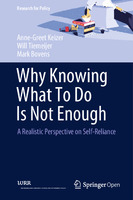Why Knowing What To Do Is Not Enough
A Realistic Perspective on Self-Reliance
Author(s)
Keizer, Anne-Greet
Tiemeijer, Will
Bovens, Mark
Language
EnglishAbstract
This open access book sets out to explain the reasons for the gap between “knowing” and “doing” in view of self-reliance, which is more and more often expected of citizens. In today’s society, people are expected to take responsibility for their own lives and be self-reliant. This is no easy feat. They must be on constant high alert in areas of life such as health, work and personal finances and, if things threaten to go awry, take appropriate action without further ado. What does this mean for public policy? Policymakers tend to assume that the government only needs to provide people with clear information and that, once properly informed, they will automatically do the right thing. However, it is becoming increasingly obvious that things do not work like that. Even though people know perfectly well what they ought to do, they often behave differently. Why is this? This book sets out to explain the reasons for the gap between ‘knowing’ and ‘doing’. It focuses on the role of non-cognitive capacities, such as setting goals, taking action, persevering and coping with setbacks, and shows how these capacities are undermined by adverse circumstances. By taking the latest psychological insights fully into account, this book presents a more realist perspective on self-reliance, and shows government officials how to design rules and institutions that allow for the natural limitations in people’s ‘capacity to act’.
Keywords
Political science; Public policy; Behavioral sciences; Personality; Social psychology; Social workDOI
10.1007/978-94-024-1725-8Publisher
Springer NaturePublisher website
https://www.springernature.com/gp/products/booksPublication date and place
Dordrecht, 2019Series
Research for Policy,Classification
Social work
Psychology: the self, ego, identity, personality
Public administration
Ethology and animal behaviour


 Download
Download Web Shop
Web Shop